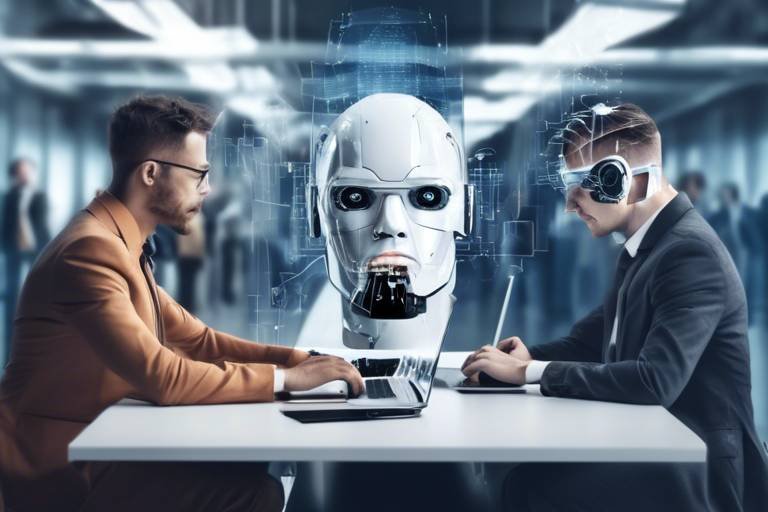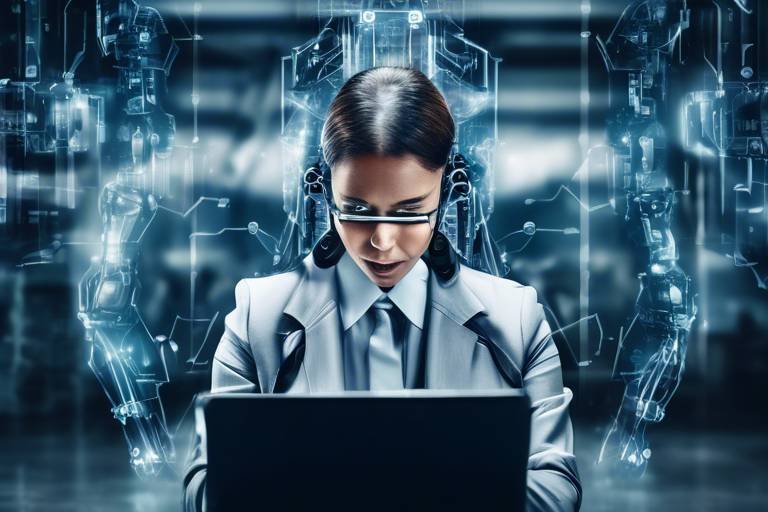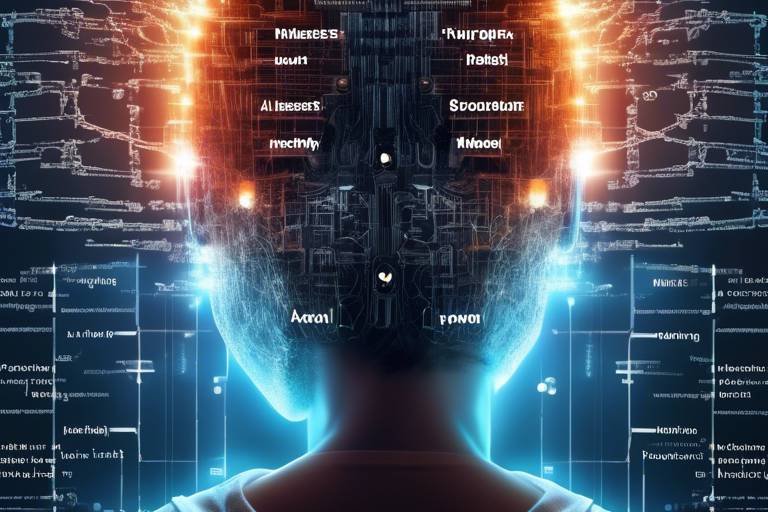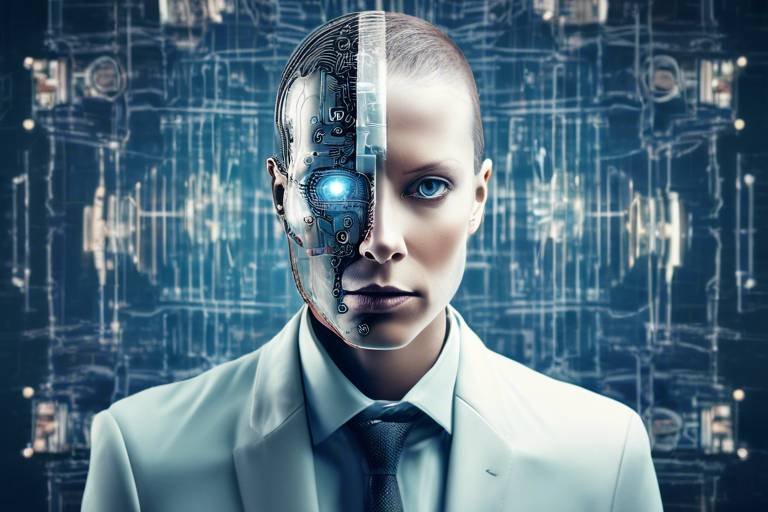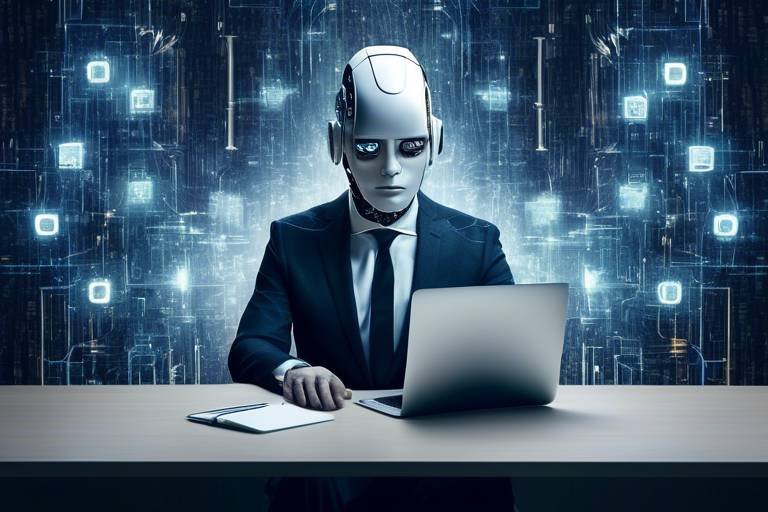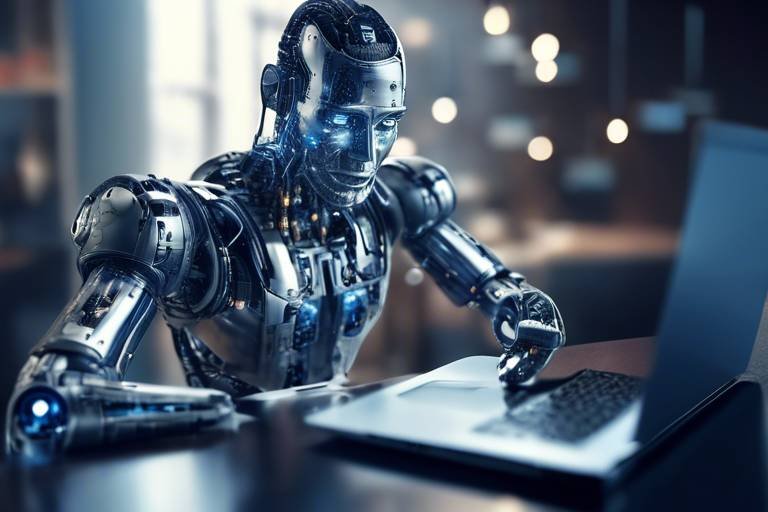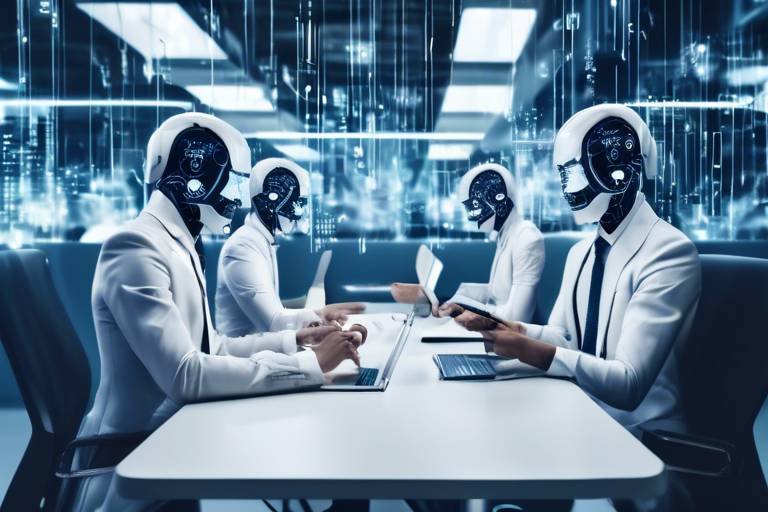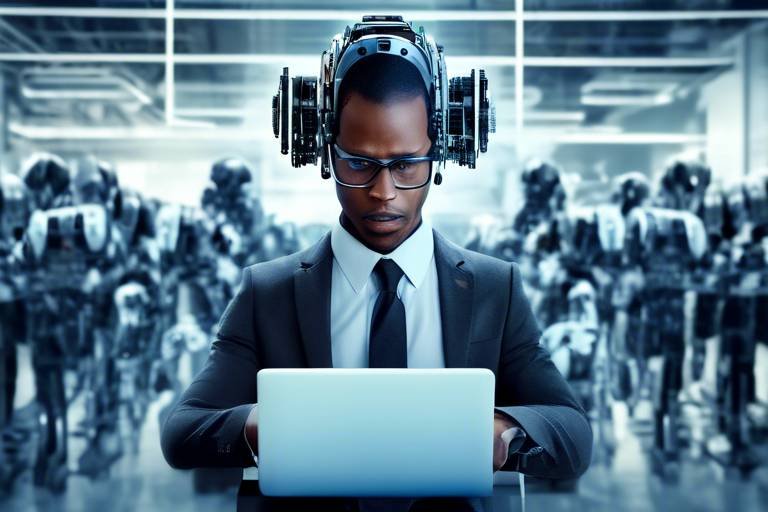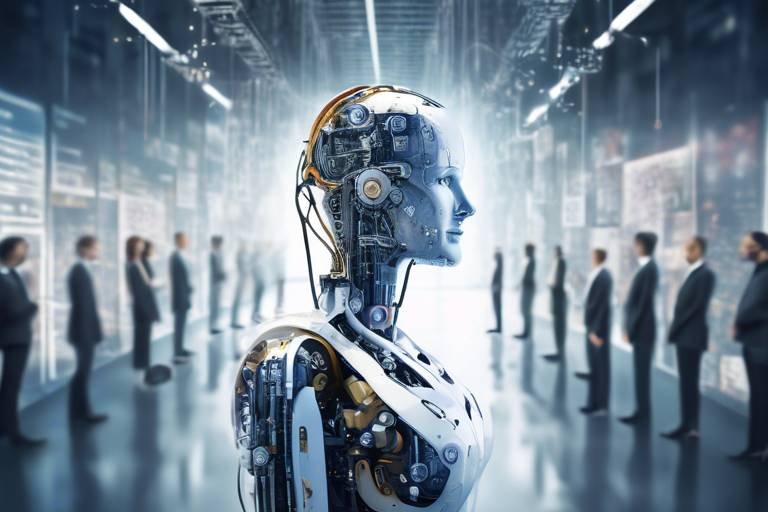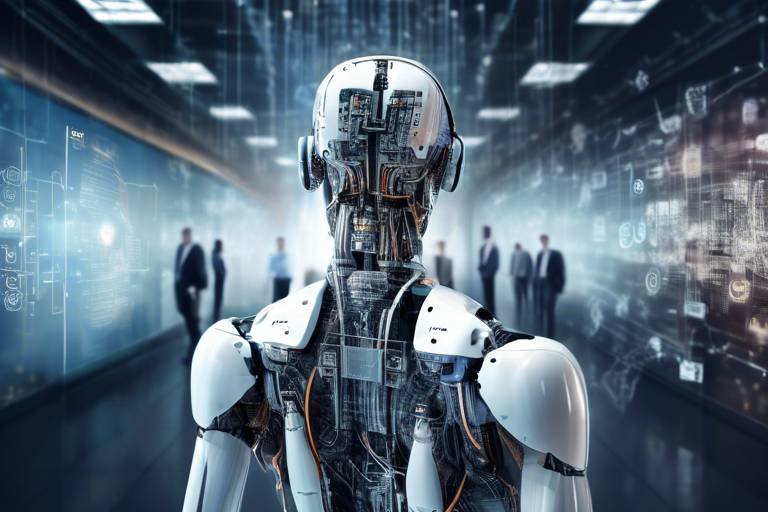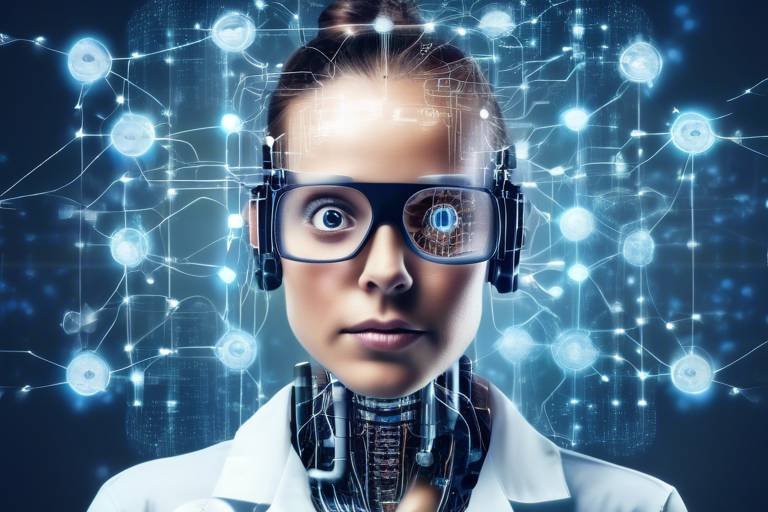Future Job Market Dynamism and the Integration with AI
The world of work is undergoing a seismic shift, with artificial intelligence (AI) at the helm, steering us toward an uncharted territory filled with both opportunities and challenges. As we stand on the brink of this transformation, it's essential to recognize how AI is not just a tool but a catalyst for change in the job market. Imagine a landscape where traditional roles are redefined, new job categories emerge, and the very essence of work evolves to meet the demands of a tech-savvy society. This article delves into the intricate dynamics of the future job market, exploring how AI integration is reshaping the workforce and what it means for both employees and employers.
At the heart of this transformation lies the undeniable fact that AI is not merely replacing jobs; it's creating them. As industries adapt to incorporate advanced technologies, we see the rise of roles that require a unique blend of skills tailored to the demands of a digital age. For example, jobs in AI development, data analysis, and ethical AI management are becoming increasingly vital. This shift prompts us to ask: Are we ready for the new skill sets that these roles demand? The answer lies in our willingness to embrace change and invest in our own learning.
Moreover, the integration of AI into various sectors is not just a trend—it’s a necessity. Companies that fail to adapt risk falling behind in a competitive market. As a result, businesses are rethinking their strategies, focusing on how they can leverage AI to enhance productivity and efficiency. This means a shift from traditional employment models to more dynamic structures that prioritize flexibility and innovation. The future of work will require us to be more agile than ever before.
However, with great change comes great responsibility. The challenges posed by AI integration, such as job displacement and ethical concerns, cannot be ignored. As AI automates routine tasks, we must consider the implications for those whose jobs are at risk. Are we prepared to support these individuals through transition programs that facilitate reskilling and upskilling? The conversation around ethical AI use is equally critical, as we must ensure that the deployment of AI technologies is equitable and just for all employees.
As we navigate this evolving landscape, it's important to recognize that the future workforce will be characterized by collaboration between humans and AI. Rather than viewing AI as a replacement, we should see it as an augmentation of human capabilities. This partnership can lead to enhanced creativity, efficiency, and problem-solving abilities. Think of it as a dance where both partners bring their unique strengths to the floor—together, they create something greater than the sum of their parts.
In conclusion, the future job market is not a distant reality; it’s unfolding right before our eyes. By understanding the dynamics at play and proactively adapting to the changes brought about by AI, we can equip ourselves and our organizations for success. The key lies in embracing lifelong learning, fostering innovation, and recognizing the value of both technical and soft skills. As we step into this new era, let’s prepare ourselves to not just survive but thrive in a world where AI and human potential coexist harmoniously.
- What types of jobs are being created by AI? AI is leading to the emergence of roles such as AI specialists, data analysts, and ethical AI managers.
- How can individuals prepare for the future job market? Continuous education, networking, and skill diversification are essential strategies for staying competitive.
- What are the ethical concerns surrounding AI in the workplace? The ethical implications include job displacement, bias in AI algorithms, and ensuring equitable access to technology.
- How can organizations support employees affected by AI integration? Companies can invest in reskilling and upskilling programs to help employees transition into new roles.

The Impact of AI on Job Creation
Artificial Intelligence (AI) is not just a buzzword; it’s reshaping the very fabric of our job market. Imagine walking into a world where machines and humans collaborate, creating opportunities that were once unimaginable. AI is leading to the emergence of new job roles that require unique skill sets, fundamentally altering traditional employment landscapes. This transformation is akin to a butterfly emerging from its chrysalis—while it might be daunting, the end result is a beautiful evolution.
As industries integrate AI technologies, we see a shift from traditional roles to positions that focus on AI development, management, and ethics. For instance, roles such as AI trainers, data scientists, and machine learning engineers are becoming increasingly prevalent. These positions demand not only technical know-how but also a deep understanding of the ethical implications that come with AI deployment. The rise of these new job roles signifies a broader trend: while some jobs may be automated, new avenues for employment are being created that require a different set of skills.
To illustrate the impact of AI on job creation, consider the following table that highlights the transition from traditional roles to emerging roles:
| Traditional Roles | Emerging AI Roles | Skills Required |
|---|---|---|
| Data Entry Clerk | Data Analyst | Data Visualization, Statistical Analysis |
| Customer Service Representative | AI Customer Experience Manager | AI Tools Proficiency, UX Design |
| Manufacturing Operator | Automation Specialist | Robotics, Systems Integration |
This table clearly shows how the job market is evolving. While some traditional roles may diminish, the demand for skilled professionals in AI-related fields is on the rise. This shift represents a significant opportunity for workers to pivot their careers toward these emerging roles. It’s essential to understand that the narrative isn’t solely about job loss; it’s about job transformation and the creation of new pathways for employment.
Moreover, the integration of AI into various sectors is not a one-size-fits-all scenario. Different industries will experience varying levels of impact, creating a mosaic of opportunities and challenges. For example, healthcare, finance, and technology sectors are likely to see a surge in AI-related jobs, while sectors that heavily rely on manual labor may face more significant disruptions.
In conclusion, while AI may disrupt certain job functions, it simultaneously opens doors to a myriad of new opportunities. Workers who are willing to adapt and acquire the necessary skills will find themselves at the forefront of this exciting evolution. The future job market will not only require technical expertise but also a proactive approach to learning and development. Are you ready to embrace this change?
- Will AI replace all jobs? No, while AI will automate certain tasks, it will also create new job opportunities that require human skills.
- What skills should I focus on to stay relevant? Focus on technical skills related to AI as well as soft skills like adaptability, problem-solving, and emotional intelligence.
- How can I prepare for the future job market? Engage in lifelong learning, seek reskilling and upskilling opportunities, and stay informed about industry trends.

Skills of the Future
As we stand on the brink of a technological revolution, the are becoming increasingly vital for navigating the evolving job market. With artificial intelligence (AI) making significant inroads into various industries, the demand for specific skill sets is shifting dramatically. It’s not just about having the technical know-how; it’s about being adaptable and ready to embrace change. Are you ready to equip yourself with the skills that will keep you relevant in this fast-paced environment?
In this new age, technical skills related to AI, data analysis, and programming are paramount. However, it’s essential not to overlook the equally important soft skills. The ability to communicate effectively, work collaboratively, and demonstrate emotional intelligence will set candidates apart. For instance, while a data analyst may crunch numbers, it’s the ability to present those findings in a relatable way that will make the difference. This balance of hard and soft skills is what employers are increasingly seeking.
To better understand this shift, let’s break down some of the key skills that are expected to dominate the future job market:
| Skill Type | Examples | Importance |
|---|---|---|
| Technical Skills | AI programming, data analysis, cybersecurity | Essential for roles in tech-driven fields |
| Soft Skills | Adaptability, emotional intelligence, creativity | Crucial for teamwork and leadership roles |
| Digital Literacy | Proficiency in digital tools and platforms | Necessary for almost all modern jobs |
Moreover, the importance of lifelong learning cannot be overstated. With the rapid pace of technological advancements, the skills you possess today may become obsolete tomorrow. This is where the concept of reskilling and upskilling comes into play. Organizations are recognizing the need to invest in their employees by offering training programs that focus on these essential skills. This not only benefits the employees but also enhances the overall productivity and innovation within the company.
As we look forward, it’s clear that the workforce will require a blend of both technical prowess and soft skills. Workers who can adapt and thrive in this new environment will be the ones who succeed. So, what are you doing to prepare for the future? Are you actively seeking opportunities to learn and grow? The time to act is now!
- What are the most important skills to have for the future job market?
The most important skills include both technical skills such as AI programming and data analysis, as well as soft skills like adaptability and emotional intelligence.
- How can I improve my soft skills?
You can improve your soft skills by engaging in teamwork, seeking feedback, and practicing effective communication in various settings.
- Why is lifelong learning important?
Lifelong learning is crucial because it helps you stay relevant in a rapidly changing job market, allowing you to adapt to new technologies and methodologies.

Technical Skills vs. Soft Skills
In today's rapidly evolving job market, the debate around technical skills versus soft skills has become increasingly relevant. As artificial intelligence (AI) continues to permeate various industries, the need for specialized technical skills—such as programming, data analysis, and machine learning—has surged. These skills are essential for operating and developing AI systems, making them highly sought after by employers. However, while technical expertise is undeniably important, it is equally crucial to recognize the value of soft skills.
Soft skills, which include abilities such as communication, collaboration, and emotional intelligence, are becoming increasingly vital in the workplace. Imagine a scenario where a highly skilled programmer lacks the ability to effectively communicate their ideas to a team. Despite their technical prowess, they may struggle to contribute meaningfully to projects. On the flip side, a team member with strong interpersonal skills can bridge gaps, facilitate discussions, and foster a collaborative environment, enhancing overall productivity.
To illustrate the balance between these two skill sets, consider the following table:
| Skill Type | Examples | Importance |
|---|---|---|
| Technical Skills | Programming, Data Analysis, Cybersecurity | Essential for executing tasks and solving specific problems. |
| Soft Skills | Communication, Adaptability, Teamwork | Facilitates collaboration and enhances workplace culture. |
As we navigate through an AI-driven landscape, the interplay between technical and soft skills will shape the future workforce. Employers are beginning to recognize that while technical skills may get a candidate through the door, soft skills are what keep them in the room. The ability to adapt to change, work in diverse teams, and communicate effectively will set individuals apart in a competitive job market.
In essence, the future job market will not just be about being a coding whiz or a data guru; it will also be about being a well-rounded individual who can navigate the complexities of modern work environments. So, as you prepare for the future, remember that investing in both technical and soft skills will not only enhance your employability but also empower you to thrive in a world where collaboration with AI is becoming the norm.
- What are technical skills? Technical skills refer to specific knowledge and abilities required to perform specialized tasks, often related to technology.
- Why are soft skills important? Soft skills are crucial for effective communication, teamwork, and adaptability, which are essential in a collaborative work environment.
- How can I develop both skill sets? You can develop technical skills through courses and certifications, while soft skills can be enhanced through practice in real-world situations and feedback.

Importance of Lifelong Learning
Lifelong learning is no longer just a buzzword; it's a crucial strategy for anyone looking to thrive in the rapidly changing job market influenced by artificial intelligence. As technology evolves, the skills that were once sufficient can quickly become obsolete. Imagine trying to navigate a bustling city without a map or GPS; that's what it's like to face the job market without continuously updating your skills. The world of work is dynamic, and those who commit to lifelong learning are the ones who will find themselves at the forefront of innovation and opportunity.
But why is lifelong learning so vital? For starters, it enables individuals to remain relevant in their fields. As AI takes over routine tasks, the demand for specialized skills is skyrocketing. Professionals who actively seek to expand their knowledge and skill sets are better positioned to adapt to these changes. They can pivot into new roles that may not even exist yet, ensuring they remain valuable assets to their organizations.
Moreover, lifelong learning fosters a culture of adaptability. In a world where change is the only constant, being open to new ideas and methodologies can set you apart. For instance, consider how quickly social media platforms have evolved. Those who embraced the changes and learned to leverage these tools effectively have seen tremendous success, while others who resisted have fallen behind.
To illustrate the importance of lifelong learning, let’s consider a few key benefits:
- Enhanced Career Opportunities: Continuous learning opens doors to new roles and promotions, making you a more attractive candidate for employers.
- Increased Job Satisfaction: Gaining new skills can lead to more engaging work, boosting your overall job satisfaction.
- Networking Opportunities: Engaging in learning environments, such as workshops or online courses, allows you to meet like-minded individuals and expand your professional network.
Organizations also recognize the importance of fostering a culture of lifelong learning. Companies that encourage their employees to pursue ongoing education and training often see improved performance and innovation. By investing in their workforce, they not only enhance employee satisfaction but also drive business growth. This creates a win-win situation where both the organization and its employees benefit.
In conclusion, the importance of lifelong learning cannot be overstated. As we navigate through an era defined by rapid technological advancements, embracing a mindset of continuous improvement will be key to not just surviving but thriving in the future job market. So, whether it's through formal education, online courses, or self-directed learning, make a commitment today to invest in your future.
Q1: What is lifelong learning?
A1: Lifelong learning refers to the ongoing, voluntary, and self-motivated pursuit of knowledge for personal or professional development. It encompasses various forms of education, including formal courses, workshops, and self-study.
Q2: Why is lifelong learning important in the age of AI?
A2: As AI continues to reshape job roles and industries, lifelong learning helps individuals stay relevant, adapt to changes, and seize new opportunities that arise from technological advancements.
Q3: How can I start my lifelong learning journey?
A3: You can begin by identifying areas of interest or skills you want to develop. Explore online courses, attend workshops, read books, or engage in professional networks to enhance your knowledge continuously.

Reskilling and Upskilling Initiatives
In today's fast-paced world, where technology is evolving at lightning speed, reskilling and upskilling have become essential for both employees and organizations. As artificial intelligence (AI) continues to reshape the job landscape, workers must adapt to new roles and skill requirements. This isn't just a matter of keeping up; it's about thriving in an environment where the only constant is change.
Organizations are recognizing the importance of investing in their workforce to ensure sustainability and growth. Reskilling involves training employees for new roles, often in response to technological advancements or shifts in business strategy. On the other hand, upskilling refers to enhancing existing skills to improve performance within current roles. Both initiatives are critical in fostering a culture of adaptability and innovation.
To effectively implement reskilling and upskilling initiatives, companies are adopting various strategies, including:
- Tailored Training Programs: Organizations are developing customized training programs that address the specific needs of their employees. This ensures that the skills being taught are relevant and applicable to their current or future roles.
- Mentorship Opportunities: Pairing less experienced employees with seasoned professionals can facilitate knowledge transfer and provide real-world insights into navigating new technologies.
- Online Learning Platforms: With the rise of digital learning, companies are leveraging online platforms that offer flexible, self-paced courses. This allows employees to learn at their convenience while balancing work and personal commitments.
Moreover, the shift towards a more collaborative work environment means that teams can benefit from shared learning experiences. For example, cross-functional workshops can encourage employees to learn from each other's expertise, fostering a sense of community and teamwork. This not only enhances individual skills but also contributes to a more cohesive organizational culture.
As we look to the future, it's clear that reskilling and upskilling are not just buzzwords; they are vital components of a successful workforce strategy. By prioritizing these initiatives, companies can not only mitigate the risks associated with AI and automation but also empower their employees to take charge of their career trajectories. In doing so, they create a more resilient and agile workforce capable of navigating the complexities of the modern job market.
Here are some common questions regarding reskilling and upskilling initiatives:
- What is the difference between reskilling and upskilling? Reskilling prepares employees for new roles, while upskilling enhances their current skills.
- Why are reskilling and upskilling important? They help employees adapt to technological changes and ensure organizations remain competitive.
- How can companies implement effective training programs? By tailoring programs to specific needs, offering mentorship, and utilizing online learning platforms.

Emerging Job Roles in AI
The rapid evolution of artificial intelligence (AI) is not just about machines taking over tasks; it's also about the birth of new career opportunities that didn't exist a decade ago. As organizations increasingly rely on AI to enhance their operations, a plethora of emerging job roles are surfacing, each demanding a unique mix of skills and expertise. These roles are reshaping the job market landscape and offering exciting prospects for those willing to adapt.
Among the most notable emerging positions is that of the AI Ethicist. As businesses grapple with the ethical implications of deploying AI technologies, the need for professionals who can navigate these complex moral landscapes is more critical than ever. AI Ethicists are responsible for ensuring that AI systems are designed and implemented in a way that is fair, transparent, and respects user privacy. They act as a bridge between technological innovation and ethical responsibility, helping organizations avoid potential pitfalls.
Another significant role is that of the Machine Learning Engineer, who specializes in designing and implementing algorithms that allow machines to learn from data. This role requires a strong foundation in both programming and statistical analysis, making it ideal for those with a technical background. As companies seek to harness the power of data, Machine Learning Engineers will be at the forefront of developing solutions that drive business success.
A less traditional but equally important role is that of the AI Trainer. This position involves training AI systems to understand and process human language, images, or other inputs effectively. AI Trainers work closely with data, curating and annotating datasets to ensure that machines learn accurately. This role emphasizes the importance of human oversight in AI development, highlighting that while machines can learn, they still need guidance to function optimally.
Additionally, the role of the Data Detective is gaining traction. This unique position focuses on uncovering insights from vast amounts of data, identifying patterns and anomalies that can inform business strategies. Data Detectives utilize their analytical skills to solve complex problems, making them invaluable in a data-driven world.
In summary, the integration of AI into various sectors is not just transforming existing roles but also paving the way for new job titles that require a blend of technical prowess and ethical consideration. As we look to the future, it's essential for both individuals and organizations to recognize these emerging roles and invest in the necessary skills to thrive in this dynamic landscape.
- What skills are essential for emerging AI roles?
Skills such as programming, data analysis, ethical reasoning, and communication are crucial for success in AI-related positions. - How can I prepare for a career in an AI-related field?
Engaging in continuous learning, pursuing relevant certifications, and gaining hands-on experience through internships or projects can be beneficial. - Are there opportunities for non-technical professionals in AI?
Absolutely! Roles such as AI Ethicists and project managers focus on the strategic and ethical aspects of AI, allowing non-technical professionals to contribute significantly.

Challenges of AI Integration
The integration of artificial intelligence (AI) into the workforce is not just a matter of plugging in new technology and watching it work wonders. In reality, it presents a myriad of challenges that can significantly impact both employees and organizations. One of the most pressing concerns is job displacement. As AI systems become more capable of automating routine and repetitive tasks, many workers find themselves facing uncertainty about their future roles. This raises an important question: how can we support those who may be displaced by these technological advancements?
Another challenge lies in the ethical considerations surrounding AI. With great power comes great responsibility, and the deployment of AI in workplaces is no exception. Companies must grapple with ensuring that AI is used responsibly and equitably, preventing biases in decision-making processes that could unfairly impact certain groups of employees. For instance, if an AI system is trained on biased data, it may perpetuate those biases in hiring or promotion decisions. To address these ethical dilemmas, organizations need to establish clear guidelines and frameworks that govern AI usage.
Moreover, the rapid pace of AI development raises questions about regulatory frameworks. Governments and organizations must work collaboratively to create regulations that not only protect workers but also encourage innovation. This is a delicate balance to strike. Too much regulation might stifle creativity and slow down progress, while too little could lead to rampant misuse of AI technologies, further complicating the job market landscape.
In addition to job displacement and ethical concerns, organizations face the challenge of integrating AI into their existing structures. This often requires significant investment in technology and training. Companies need to ensure that their employees are not only equipped with the necessary technical skills but also understand how to work alongside AI systems effectively. The success of AI integration largely depends on fostering a culture of collaboration between humans and machines.
To summarize, the challenges of AI integration are multifaceted and require a proactive approach from both workers and organizations. As we navigate this new frontier, it's essential to consider the broader implications of AI on employment, ethics, and regulation. Addressing these challenges head-on will not only help mitigate potential negative impacts but also pave the way for a future where AI and humans can coexist and thrive together.
- What are the main challenges of integrating AI into the workforce?
Job displacement, ethical considerations, and the need for regulatory frameworks are some of the primary challenges. - How can companies support employees who may be displaced by AI?
Companies can implement transition programs, offer retraining opportunities, and foster a culture of lifelong learning. - What ethical concerns arise from AI integration?
Issues such as bias in AI decision-making and the need for responsible usage are significant ethical concerns. - How can organizations ensure successful AI integration?
Investing in employee training, establishing clear guidelines for AI usage, and promoting collaboration between humans and AI are key strategies.

Job Displacement Concerns
The rise of artificial intelligence (AI) is undeniably transforming the job landscape, but with this transformation comes a wave of . As AI technologies advance, they are increasingly capable of performing tasks that were once the exclusive domain of human workers. This shift raises a critical question: how do we support those whose jobs may be replaced by machines? The fear of job loss can be overwhelming, not just for individuals but for entire communities that rely on specific industries.
Consider the manufacturing sector, where robots have taken over assembly line tasks, leading to a significant reduction in the number of available jobs. Similarly, roles in customer service are being automated through AI chatbots and virtual assistants, which can handle inquiries faster and more efficiently than human agents. While these technologies enhance productivity and reduce costs, they also create a paradox: how do we balance efficiency with the human need for meaningful work?
To address these concerns, it’s essential to implement transition programs that provide support for workers affected by AI-driven changes. Such programs could include:
- Job retraining: Offering training programs that help displaced workers acquire new skills relevant to the evolving job market.
- Career counseling: Providing resources to help individuals explore new career paths that align with their skills and interests.
- Financial support: Implementing temporary financial assistance for those who may struggle during their transition to new employment.
Moreover, businesses have a role to play in this transition. By fostering a culture of reskilling and upskilling, organizations can help their employees adapt to new technologies rather than simply replacing them. This proactive approach not only benefits the workforce but also enhances company loyalty and morale. In essence, when companies invest in their employees' futures, they are investing in their own sustainability.
As we navigate these changes, it’s crucial to engage in open dialogues about the implications of AI on employment. Policymakers, businesses, and communities must work together to create a framework that not only addresses job displacement but also champions innovation and human potential. After all, the goal shouldn't be to eliminate jobs but to evolve them, ensuring that technology serves as an ally rather than an adversary in the workforce.
- Will AI completely replace human jobs? While AI may automate certain tasks, it is more likely to change the nature of jobs rather than eliminate them entirely. Many roles will evolve to incorporate AI as a tool.
- What can I do if my job is at risk due to AI? Consider exploring reskilling or upskilling opportunities. Engage in lifelong learning to stay relevant in the job market.
- How can companies support employees facing job displacement? Companies can implement retraining programs, offer career counseling, and provide financial support during transitions.

Ethical Considerations
As we embrace the integration of artificial intelligence into the workplace, it is imperative to address the that accompany this transformation. The rapid advancement of AI technologies brings with it a host of ethical dilemmas that can impact not just businesses, but the very fabric of society. For instance, how do we ensure that AI systems are designed and implemented in a way that is fair and equitable? As these technologies increasingly influence decision-making processes, we must be vigilant about the potential for bias in AI algorithms, which can inadvertently lead to discrimination in hiring practices, promotions, and employee evaluations.
Moreover, the use of AI raises significant questions about privacy. With AI systems capable of processing vast amounts of personal data, organizations must prioritize the protection of employee privacy. This involves establishing clear guidelines on data collection, usage, and storage, ensuring transparency in how data is handled. Employees should feel confident that their personal information is safeguarded and not exploited for unintended purposes.
Another critical ethical consideration is the accountability of AI systems. When decisions are made by algorithms, who is responsible for the outcomes? This is particularly important in scenarios where AI systems make life-altering decisions, such as in healthcare or criminal justice. Organizations must develop frameworks that clarify accountability and ensure that there are mechanisms in place to address any negative consequences arising from AI decisions.
To navigate these ethical waters, companies can adopt several guiding principles:
- Transparency: Clearly communicate how AI systems operate and the data they use.
- Fairness: Regularly audit AI systems for bias and ensure equitable treatment of all employees.
- Privacy: Implement robust data protection measures to safeguard personal information.
- Accountability: Establish clear lines of responsibility for AI-driven decisions.
By addressing these ethical considerations head-on, organizations can foster a culture of trust and responsibility, ensuring that AI serves as a tool for empowerment rather than a source of division. The future of work is not just about technology; it's about how we choose to use that technology to create a better, more equitable workplace for everyone.
Q: What are the main ethical concerns surrounding AI in the workplace?
A: The primary ethical concerns include bias in algorithms, privacy issues, and accountability for decisions made by AI systems. Organizations must ensure that AI is used responsibly and equitably.
Q: How can companies ensure fairness in AI systems?
A: Companies can conduct regular audits to identify and mitigate bias in AI algorithms, involve diverse teams in the development process, and establish clear guidelines for equitable treatment of all employees.
Q: What measures can be taken to protect employee privacy?
A: Organizations should implement strong data protection policies, ensure transparency about data usage, and provide employees with control over their personal information.
Q: Who is responsible for the decisions made by AI systems?
A: Accountability should be clearly defined within organizations, with designated individuals or teams responsible for overseeing AI systems and addressing any negative outcomes.
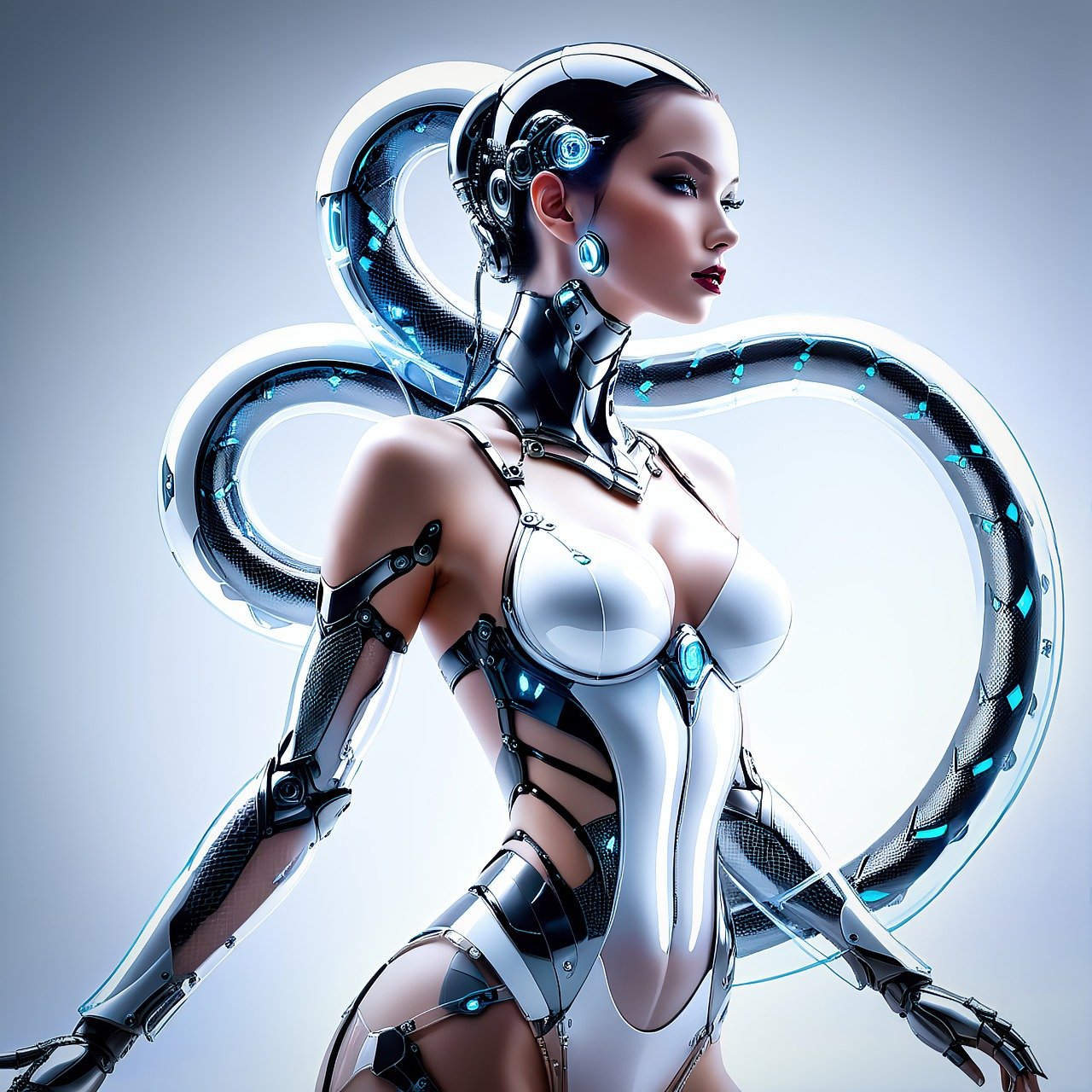
Future Workforce Trends
The future workforce is on the brink of a transformation, and the driving force behind this change is none other than artificial intelligence (AI). As we move forward, it's clear that AI will not just be a tool but a partner in how we work. Imagine a world where your colleague is a highly advanced AI system, helping you with tasks, providing insights, and streamlining processes. This isn't science fiction; it's the reality we're heading towards. The integration of AI into various sectors is reshaping job roles, enhancing productivity, and fostering a new culture of collaboration.
One of the most significant trends we can expect is the rise of remote work. Thanks to AI technologies, working from home or any location is becoming increasingly feasible. AI tools facilitate communication, project management, and even performance tracking, making it easier for teams to collaborate across different time zones and geographic locations. This flexibility not only improves work-life balance but also opens up job opportunities for people in remote areas, creating a more inclusive workforce.
Moreover, we are witnessing a shift towards enhanced collaboration between humans and AI. Rather than viewing AI as a competitor, the future job market will emphasize a partnership where technology augments human capabilities. For instance, AI can handle data analysis and routine tasks, allowing workers to focus on creative problem-solving and strategic decision-making. This symbiotic relationship is essential for fostering innovation and driving business success.
As organizations adapt to these trends, they must also consider the implications for their workforce. Companies will need to rethink their structures and processes to integrate AI effectively. This might mean reshaping teams, redefining roles, and investing in training programs that emphasize both technical and soft skills. The ability to work alongside AI will become a crucial competency, and organizations that prioritize this will have a competitive edge.
In summary, the future workforce is poised for a dynamic shift, driven by AI integration. With the rise of remote work and the collaboration between humans and AI, businesses must adapt to thrive in this new landscape. The key will be to embrace these changes, invest in employee development, and foster an innovative culture that leverages the strengths of both humans and technology.
- How will AI affect job security?
While AI may automate certain tasks, it will also create new job opportunities that require different skills. Workers who adapt and learn to work alongside AI will find themselves in a strong position. - What skills will be most important in the future workforce?
Technical skills related to AI and data analysis will be crucial, but soft skills like adaptability, communication, and emotional intelligence will also be vital. - How can individuals prepare for changes in the job market?
Individuals can focus on continuous learning, skill diversification, and networking to stay relevant in an evolving job market. - What role will remote work play in the future?
Remote work is expected to become standard in many industries, facilitated by AI technologies that enhance collaboration and productivity.

The Rise of Remote Work
In recent years, remote work has transitioned from a niche concept to a mainstream practice, and it’s largely thanks to advancements in artificial intelligence and technology. Imagine waking up, brewing your favorite coffee, and logging into your work computer without the hassle of a daily commute. Sounds like a dream, right? Well, for many, this is now a reality. The rise of remote work has opened doors to new opportunities, allowing employees to enjoy a better work-life balance while also increasing productivity.
AI plays a crucial role in this transformation. With tools powered by AI, teams can communicate seamlessly, share documents effortlessly, and collaborate in real-time, regardless of their physical locations. This shift has not only changed where we work but also how we work. Companies are now leveraging AI to manage projects, track productivity, and even facilitate virtual meetings. The result? A more efficient workflow that can adapt to the needs of a diverse workforce.
However, it’s essential to recognize that the rise of remote work comes with its own set of challenges. For instance, maintaining team cohesion and company culture can be tricky when everyone is working from different places. Employees might feel isolated, leading to a potential decline in morale. To mitigate these issues, organizations are employing various strategies, such as:
- Regular virtual team-building activities
- Open lines of communication through chat platforms
- Flexible work hours to accommodate different time zones
Moreover, the flexibility that remote work offers is a double-edged sword. While it allows employees to customize their work environments, it can also blur the lines between work and personal life. This can lead to burnout if not managed correctly. Employers and employees alike must be vigilant about setting boundaries and ensuring that work does not encroach on personal time.
As we look to the future, it’s clear that remote work is here to stay. Companies that embrace this change will not only attract top talent but also foster a culture of innovation and adaptability. In fact, a recent study found that 70% of employees would prefer to work remotely at least part of the time, indicating a strong demand for flexible work arrangements. This trend is likely to shape the job market significantly in the coming years, leading to a more dynamic and inclusive workforce.
In conclusion, the rise of remote work, fueled by AI advancements, presents both opportunities and challenges. As we navigate this new landscape, it’s essential for individuals and organizations to remain proactive, adapting to changes and leveraging technology to create a productive and fulfilling work environment.
- What are the main benefits of remote work?
Remote work offers flexibility, reduced commuting time, and the ability to work from anywhere, which can lead to increased productivity and improved work-life balance. - How can companies maintain team cohesion in a remote setting?
Companies can foster team cohesion through regular virtual meetings, team-building activities, and open communication channels. - What challenges do remote workers face?
Remote workers may struggle with feelings of isolation, difficulty separating work from personal life, and maintaining motivation without a structured office environment.

Collaboration Between Humans and AI
The future job market is not just about machines taking over human tasks; it’s about the exciting collaboration that will unfold between humans and artificial intelligence (AI). Imagine a world where your daily tasks are enhanced by AI, making you more efficient and effective in your role. This partnership is not merely a trend; it’s the new norm that is gradually reshaping how we work. Think of AI as a powerful tool that, when used correctly, can amplify human potential rather than replace it.
In this evolving landscape, the synergy between humans and AI can lead to remarkable outcomes. For instance, AI can handle repetitive tasks with precision, allowing humans to focus on more creative and strategic aspects of their jobs. This not only boosts productivity but also enhances job satisfaction. Workers can engage in problem-solving, critical thinking, and innovation—areas where human intuition and creativity shine. The key lies in understanding how to leverage AI effectively.
As organizations adopt AI technologies, they will need to foster an environment that encourages collaboration. This could involve training programs that teach employees how to work alongside AI tools. For example, consider a data analyst who uses AI to sift through vast amounts of data. Instead of merely crunching numbers, the analyst can interpret insights generated by AI, leading to more informed decision-making. Here, AI acts as a partner, providing valuable data while the analyst applies their expertise to derive meaningful conclusions.
Moreover, industries are beginning to recognize the importance of human oversight in AI processes. While AI can analyze data and generate recommendations, human judgment is crucial in contexts such as healthcare, finance, and autonomous driving. In these fields, ethical considerations and nuanced understanding are paramount. Therefore, a collaborative approach ensures that AI is used responsibly, with humans guiding its application to align with societal values.
To illustrate the potential benefits of this collaboration, let’s look at a few key areas:
- Enhanced Decision-Making: AI can analyze trends and predict outcomes, providing humans with data-driven insights that support better decisions.
- Increased Efficiency: By automating mundane tasks, AI allows employees to dedicate time to higher-level thinking and creativity.
- Personalized Experiences: In customer service, AI can analyze customer behavior, enabling humans to tailor interactions and improve satisfaction.
As we move forward, the relationship between humans and AI will continue to evolve. Organizations that embrace this collaboration will not only enhance their operational efficiency but also create a more engaging and fulfilling work environment for their employees. In this partnership, humans bring creativity, empathy, and ethical considerations, while AI contributes speed, accuracy, and data analysis capabilities. Together, they can tackle challenges and seize opportunities in ways that neither could achieve alone.
Q1: Will AI replace all human jobs?
A1: Not entirely. While AI will automate certain tasks, it will also create new roles that require human skills, particularly in areas like creativity, strategy, and emotional intelligence.
Q2: How can I prepare for a job that involves collaboration with AI?
A2: Focus on developing both technical skills related to AI and soft skills such as adaptability and communication. Continuous learning is crucial.
Q3: What industries are most likely to benefit from human-AI collaboration?
A3: Industries such as healthcare, finance, manufacturing, and customer service are expected to see significant improvements through effective collaboration between humans and AI.
Q4: How can organizations encourage collaboration between their employees and AI?
A4: Organizations can provide training programs, promote a culture of innovation, and ensure that employees understand how to leverage AI tools effectively.

Preparing for the Future
As we stand on the brink of a new era shaped by artificial intelligence, it's crucial for both individuals and organizations to proactively adapt to the changes that lie ahead. The landscape of work is evolving, and those who take the initiative to prepare will find themselves at a significant advantage. But how can one navigate this dynamic job market effectively? The answer lies in embracing a multifaceted approach.
For individuals, the journey begins with continuous education. It's no longer enough to rely solely on traditional education systems; lifelong learning has become imperative. This means actively seeking out new knowledge and skills through various channels. Online courses, workshops, and certification programs are excellent resources that can help keep your skills sharp and relevant. Additionally, networking plays a pivotal role in career advancement. Building relationships within your industry can open doors to opportunities that may not be visible otherwise. Attend industry conferences, join professional organizations, and engage with peers on social media platforms to expand your network.
Organizations, on the other hand, need to foster a culture of innovation and adaptability. This involves not just investing in employee development but also creating an environment where creative thinking and experimentation are encouraged. Employees should feel empowered to share ideas and collaborate on projects that leverage AI technologies to enhance productivity. By nurturing a mindset that embraces change, companies can better position themselves to thrive in the face of evolving market demands.
Moreover, companies must also focus on diversifying their workforce. A diverse team brings a variety of perspectives and ideas, which can lead to more innovative solutions. Embracing diversity isn't just a moral imperative; it's a strategic advantage in an AI-driven world where creativity and problem-solving skills are paramount. Organizations should actively seek to recruit individuals from different backgrounds and disciplines to enrich their teams.
To illustrate the importance of preparation, consider the following table that outlines key strategies for individuals and organizations:
| Strategy | For Individuals | For Organizations |
|---|---|---|
| Continuous Education | Engage in online courses and workshops | Offer training programs and resources |
| Networking | Attend conferences and connect online | Encourage team collaboration and partnerships |
| Cultural Adaptation | Embrace change and seek feedback | Foster a culture of innovation and creativity |
| Diversity | Seek diverse experiences and perspectives | Recruit from varied backgrounds and disciplines |
In summary, preparing for the future in an AI-enhanced job market requires a proactive and strategic approach. By embracing continuous learning, networking, fostering innovation, and prioritizing diversity, both individuals and organizations can navigate the complexities of the evolving workforce with confidence. Remember, the future belongs to those who are willing to adapt and grow.
- What skills should I focus on developing for the future job market? Focus on both technical skills related to AI and soft skills like adaptability and emotional intelligence.
- How can I stay updated on industry trends? Engage in continuous education, follow industry leaders on social media, and attend relevant conferences.
- What role does networking play in career advancement? Networking can open doors to new opportunities and provide valuable insights from industry peers.
- How can organizations support their employees in adapting to AI? Organizations can invest in training programs, foster a culture of innovation, and encourage collaboration.

Strategies for Individuals
In a world where artificial intelligence is rapidly reshaping the job landscape, individuals must arm themselves with effective strategies to stay relevant and competitive. The key to thriving in this evolving environment lies in a proactive approach to career development. So, what can you do to ensure your skills remain in demand? Here are some essential strategies that can help you navigate this dynamic job market.
First and foremost, networking is an invaluable tool. Building connections with professionals in your field can open doors to new opportunities and provide insights into industry trends. Attend industry conferences, join online forums, and engage in social media groups related to your profession. Remember, every new connection could lead to potential collaborations or job offers that you might not find through traditional job searching methods.
Next, embrace the concept of continuous education. The pace of technological advancement means that the skills you possess today might not be sufficient tomorrow. Consider enrolling in online courses or workshops that focus on emerging technologies, especially those related to AI and data analytics. For instance, platforms like Coursera, Udacity, and LinkedIn Learning offer a plethora of courses that can help you gain relevant expertise. By staying updated with the latest developments in your field, you not only enhance your skill set but also demonstrate to employers that you are committed to personal growth.
In addition to technical skills, don’t overlook the importance of soft skills. Skills such as communication, adaptability, and emotional intelligence are becoming increasingly valuable as workplaces evolve. Employers are looking for individuals who can work well in teams, manage conflicts, and adapt to changing circumstances. Therefore, actively seek out opportunities to develop these skills through volunteer work, team projects, or even public speaking engagements.
Moreover, consider skill diversification. While it’s essential to have a strong foundation in your primary area of expertise, branching out into related fields can make you more versatile and appealing to employers. For example, if you are a marketing professional, gaining knowledge in data analytics or SEO can enhance your value in a data-driven market. This not only broadens your career prospects but also equips you to tackle various challenges that may arise in your role.
Lastly, don’t underestimate the power of personal branding. In an increasingly digital world, how you present yourself online can significantly impact your career. Create a professional online presence through platforms like LinkedIn, where you can showcase your skills, experiences, and achievements. Regularly update your profile with new certifications, projects, and recommendations from colleagues. This not only boosts your visibility but also establishes you as a knowledgeable professional in your field.
In summary, the strategies for individuals in the face of AI-driven job market changes revolve around networking, continuous education, soft skill development, skill diversification, and personal branding. By taking these proactive steps, you can position yourself for success in a future where adaptability and lifelong learning are key.
- What are the most important skills to develop for the future job market?
Technical skills related to AI and data analysis, along with soft skills like adaptability, communication, and emotional intelligence, are crucial. - How can I stay updated with the latest industry trends?
Networking, attending workshops, and enrolling in online courses are excellent ways to stay informed. - Is it necessary to have a degree in AI to work in an AI-related field?
No, while a degree can be beneficial, practical experience and relevant skills often hold more weight in the job market. - How can I effectively network in a digital world?
Utilize social media platforms, attend virtual conferences, and engage in online forums relevant to your industry.

Organizational Adaptation
In today's rapidly evolving job market, organizations must embrace change to stay competitive and relevant. This means not just reacting to the advancements in artificial intelligence (AI) but actively integrating these technologies into their operations. The key to successful adaptation lies in fostering a culture that encourages innovation and agility among employees. By doing so, companies can leverage AI to enhance productivity and efficiency while simultaneously creating an environment that values continuous improvement.
One of the first steps organizations can take is to invest in employee development. This involves not only providing training on new technologies but also encouraging employees to pursue personal growth through lifelong learning. Companies can implement various programs, such as workshops, online courses, and mentorship opportunities, to help employees acquire the skills they need to thrive in an AI-driven landscape. For instance, a tech firm might offer coding boot camps for its staff, while a manufacturing company could provide training on how to operate and maintain AI-driven machinery.
Moreover, organizations should focus on building a collaborative environment where employees feel safe to experiment with new ideas and technologies. This could mean establishing cross-functional teams that bring together diverse skill sets and perspectives, allowing for more innovative solutions to emerge. When employees from different departments collaborate, they can share insights and best practices, ultimately leading to a more cohesive approach to integrating AI.
Another critical aspect of organizational adaptation is the implementation of agile methodologies. By adopting agile practices, companies can respond more swiftly to changes in the market and customer demands. Agile frameworks encourage iterative development and feedback loops, which can be particularly beneficial when integrating AI tools. For example, a marketing team might use AI-driven analytics to test and refine campaigns in real-time, adjusting their strategies based on immediate feedback.
As organizations adapt, they must also be mindful of the ethical implications of AI. Companies should establish clear policies and guidelines to ensure that AI is used responsibly and equitably. This includes considering the potential biases in AI algorithms and actively working to mitigate them. By prioritizing ethical considerations, organizations can build trust with their employees and customers, ultimately enhancing their reputation and brand loyalty.
In summary, organizational adaptation in the age of AI is not merely about technology; it’s about transforming the workplace culture to embrace innovation, collaboration, and ethical practices. Companies that invest in their employees, adopt agile methodologies, and prioritize ethical considerations will not only survive but thrive in the future job market.
- What is the importance of employee development in adapting to AI?
Employee development is crucial as it equips the workforce with the necessary skills to navigate and utilize AI technologies effectively, ensuring that the organization remains competitive. - How can organizations foster a culture of innovation?
Organizations can foster a culture of innovation by encouraging collaboration, providing resources for experimentation, and recognizing and rewarding creative problem-solving. - What are agile methodologies?
Agile methodologies are frameworks that promote iterative development, flexibility, and responsiveness to change, which are essential when integrating new technologies like AI. - Why is ethical AI important?
Ethical AI is important to ensure that AI technologies are used responsibly, minimizing biases and promoting fairness, which helps maintain trust among employees and customers.
Frequently Asked Questions
- How is AI impacting job creation?
AI is revolutionizing the job market by creating new roles that require specialized skills. As machines take over repetitive tasks, new opportunities arise in areas like AI development, management, and ethics, leading to a shift in traditional employment landscapes.
- What skills will be in demand in the future job market?
The future job market will see a rise in demand for both technical skills, such as data analysis and AI proficiency, and soft skills like adaptability and emotional intelligence. Workers will need to balance these skill sets to stay competitive.
- Why is lifelong learning important?
Lifelong learning is crucial because the pace of technological advancement is relentless. To remain relevant, individuals must continuously update their skills and knowledge, ensuring they can adapt to the evolving job market.
- What are reskilling and upskilling initiatives?
Reskilling and upskilling initiatives are programs organizations implement to help employees transition into new roles created by AI advancements. These initiatives focus on enhancing existing skills or teaching new ones to prepare workers for future demands.
- What challenges does AI integration present?
Integrating AI into the workforce brings challenges like job displacement, ethical concerns regarding technology use, and the necessity for regulatory frameworks to ensure responsible deployment. Addressing these challenges is vital for a smooth transition.
- How can individuals prepare for the future job market?
Individuals can prepare by networking, pursuing continuous education, and diversifying their skill sets. These strategies will help them remain competitive and adaptable in an AI-driven job market.
- What trends are emerging in the future workforce?
Emerging trends include the rise of remote work, facilitated by AI technologies, and enhanced collaboration between humans and AI. These trends indicate a shift towards more flexible work environments and a partnership model where technology augments human capabilities.
- How should organizations adapt to changes brought by AI?
Organizations should foster a culture of innovation, invest in employee development, and leverage AI to enhance productivity. Embracing change is essential for businesses to thrive in the dynamic job market influenced by AI.

